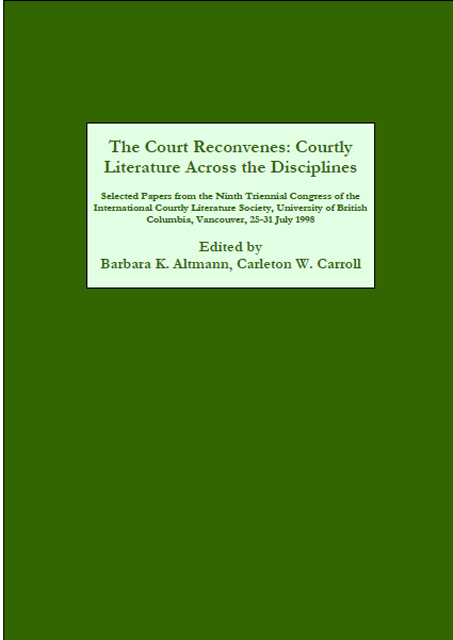 The Court Reconvenes
The Court Reconvenes “E fer en cortoisie retorner li villan”: Roland in Persia in the Entrée d’Espagne
Published online by Cambridge University Press: 31 March 2023
Summary
The “epic” Entrée d’Espagne, composed in Italy probably in the first half of the fourteenth century, purports to set forth in the vernacular the account of Charlemagne's Spanish conquest as recorded in Latin by the (pseudo) Turpin. Notable as innovation is the portrayal of its hero Roland, whose familiar epic profile is significantly nuanced in this text, making of him, in the words of one reader, “l’éclatante illustration d’une conception originale de l’héroisme épique.” Henning Krauss and others have explored the socio-economic context of such a transformation, determinant not only for the Entrée but for other poems in the franco-italian tradition that reflect the search for a new ethic appropriate to a new communal culture. And among the prominent elements of this conception figure “courtliness” and, more broadly, “courtoisie.” In the Chanson de Roland, the epithet curtois is reserved uniquely for Roland's companion Olivier, a denomination that, like his “sagesse” – in the famous formula “Roland est preux et Olivier est sage” – underlines the contrast between him and the principal hero of the poem; the adjective “cortois” to characterize the actions of individuals did not appear, Ulrich Mölk observes, in the earliest chansons de geste, and the abstract term “cortoisie” derives in all probability from the usage of the troubadours (43). Now, in the Entrée, we find a new portrait of a Roland who is not only personally “courtois” but responsible, in the long interpolated segment that recounts his sojourn in the Orient, for a civilizing mission defined as the introduction of the practices of “courtoisie” into a pagan (Saracen) world.
The importance of this thematic element is underlined by the narrator as he prepares his hero's transition to the Orient from the battleground of Spain, which Roland leaves behind after being struck by Charlemagne. Roland's subsequent adoption of a pagan disguise and his service to the Persian Sultan is not without precedent in certain late French epics, in which Christian knights evince little reluctance to participate in wars between pagans or to adopt their ways, at least in appearance.
- Type
- Chapter
- Information
- The Court ReconvenesCourtly Literature across the Disciplines: Selected Papers from the Ninth Triennial Congress of the International Courtly Literature Society, University of British Columbia, Vancouver, 25-31 July 1998, pp. 297 - 308Publisher: Boydell & BrewerPrint publication year: 2002
